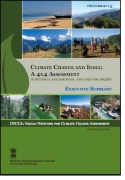/regions/india
India
Water Jobs via DevNetJobsIndia.org dated December 08, 2010
Posted on 08 Dec, 2010 02:35 PMContent Courtesy: DevNetJobsIndia
- PHED Consultant, Gwalior (Specialist in Rural Drinking Water Programme & Water Quality)
UNICEF MP/Ma-Foi
Degraded and wastelands of India - Status and spatial distribution
Posted on 07 Dec, 2010 10:16 PMThis book by NAAS and ICAR builds-on and integrates work done by different institutes of the ICAR and the Department of Space in the area of degraded and wastelands in India. NRSA had already published the state level and country level information earlier. In addition, the nature and causes of the land degradation, and the degree and extent of damaged lands needed to be determined, so that appropriate management strategies could be designed and implemented in a defined time-frame to bring these lands to ‘productive health’.
Community participation in ground water management
Posted on 07 Dec, 2010 12:29 PMKnowledge of ground water monitoring is pre-requisite for sustainable management of ground water in an area. Water level monitoring as well as understanding about its quality need to be exercised at community level enabling them to take decision on common resource.
Guidelines for Assessing the Risk to Groundwater from On–Site Sanitation (ARGOSS)
Posted on 05 Dec, 2010 05:37 PMThese "Guidelines for Assessing the Risk to Groundwater from On–Site Sanitation (ARGOSS)" were developed to provide guidance on how to assess and reduce the risk of contamination of groundwater supplies from on–site sanitation systems and are aimed at those responsible for planning low cost water supply and sanitation schemes. The manual developed by the British Geological Survey has been field tested between 1999 and 2003.
Climate change and India - A sectoral and regional analysis for 2030s by the Indian Network for Climate Change Assessment (INCCA)
Posted on 05 Dec, 2010 10:45 AM This report prepared by the Indian Network for Climate Change Assessment (INCCA) provides an assessment of impact of climate change in 2030s on four key sectors of the Indian economy, namely agriculture, water, natural ecosystems & biodiversity and health in four climate sensitive regions of India, namely the Himalayan region, the Western Ghats, the Coastal Area and the North-East Region. This is the for the first time that such a comprehensive, long term assessment has been undertaken based on rigorous scientific analysis for the 2030s (all previous assessments were for the 2070s and beyond).
This report prepared by the Indian Network for Climate Change Assessment (INCCA) provides an assessment of impact of climate change in 2030s on four key sectors of the Indian economy, namely agriculture, water, natural ecosystems & biodiversity and health in four climate sensitive regions of India, namely the Himalayan region, the Western Ghats, the Coastal Area and the North-East Region. This is the for the first time that such a comprehensive, long term assessment has been undertaken based on rigorous scientific analysis for the 2030s (all previous assessments were for the 2070s and beyond).
The Wetlands (Conservation and Management) Rules, 2010 notified by the MoEF
Posted on 04 Dec, 2010 01:01 PMThe Ministry of Environment and Forests today notified the Wetlands (Conservation and Management) Rules, 2010. These Rules have been drafted by the Ministry of Environment and Forests to ensure better conservation and management and to prevent degradation of existing wetlands in India.
Water security for India: The external dynamics - An IDSA Task Force Report
Posted on 01 Dec, 2010 08:44 PMThe report by Institute for Defence Studies and Analyses is premised on the fact that India is facing a serious water resource problem and is expected to become 'water stressed' by 2025 and 'water scarce' by 2050. It raises fundamental questions about the forces driving water demand and the political dynamics of riparian relations, both in terms of hindrances and opportunities, amongst states in the subcontinent. Rivers, a crucial source of water resources, physically link upstream and downstream users and at the same time create barriers.
Ecological Sanitation locations in India
Posted on 01 Dec, 2010 04:55 PMEcological Sanitation is a new approaching sanitation where there is minimal water use and where human waste can be used as fertilizer. It is a truly sustainable approach.
Training and Awareness Raising' :bRAINstorming - Newsletter of International Rainwater Harvesting Alliance - N 34 November 2010
Posted on 30 Nov, 2010 11:51 AMArticle and Image Courtesy: International Rainwater Harvesting Alliance (IRHA)
Peer Water Exchange (PWX) receives 2010 Intel Environment Award
Posted on 29 Nov, 2010 04:40 PM
The Peer Water Exchange (PWX) was awarded the 2010 Intel Environment Award today. PWX, a project of Blue Planet Network, is a combination of process, technology platform, and people designed to unlock the global capacity and creativity of individuals, philanthropies, businesses and implementers to solve the global safe drinking water and sanitation crises.
